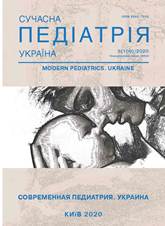Evaluation of influence factors on parents' adherence to the immunization
Keywords:
vaccination, immunization, primary prophylaxis, prevention of diseasesAbstract
In spite of individual and social benefits of immunoprophylaxis, the level of vaccinal refuses are steadily high. There are many influence factors on parents' adherence to the immunization, most of them are generated by incorrect information about immunoprophylaxis.
Purpose — to study parents' commitment level to the immunization and factors, which can influence on it, also to compare received results with similar, received in 2015 year.
Materials and methods. The level of commitment, influence factors on this rate and sources of information, which are mainly used by parents for gaining knowledges about immunization, were determined based on interrogation of 82 parents of both ill and healthy children. Interrogation was provided by personally developed questionnaires.
Results and conclusions. Positive attitude was determined in 63.4% of respondents, negative — in 6.1%, uncertain — in 30.5%. The fear of side-effects and mistrust of immunobiological remedies manufacturers were defined as dominant factors. Other factors such as religious belief and false contraindications for immunization were also defined. Parents, who used the information from their doctor as dominant source, were determined as more adherent to the vaccination. These results were compared with a similar research, which was provided in 2015: positive trends in the attitude towards certain vaccines are seen, the structure of rejection causes is stable. Educational efforts, especially aimed at primary care doctors, can help to raise commitment to immunization.
The research was carried out in accordance with the principles of the Helsinki Declaration. The study protocol was approved by the Local Ethics Committee of these Institutes. The informed consent of the patient was obtained for conducting the studies.
References
Abaturov OYe, Siedunova OV, Agafonova OO. (2015). Attitide of health workers to immunoprophylaxis and efficiacy of their health education activities regarding active immunization of the population. Zdorovia Dytyny. 1: 65–68.
Antonova NA, Eritzian KY, Dubrovskiy RH. (2014). Otkaz ot vaktsinatsii: kachestvennyiy analiz biograficheskih intervyu. Teoriya i praktika obschestvennogo razvitiya. 20: 208–211.
Boyarchuk OR, Sagal IR, Hariyan TV. (2015). Influence factors on formation of population adherence to immuniztion. Actual problems of pediatrics, obstetrics and gynecology. 2: 11–14.
Carrillo–Marquez M, White L. (2013). Current controversies in childhood vaccination. South Dakota Medicine. Spec no: 46–51.
Chernyshova LI, Lapii FI Volokha AP, Bondarenko AV, Stepanovskyi YuS, Hilfanova AM. (2019). Immunoprophylaxis of Infectious Diseases. Kyiv: Medycyna: 320.
Ginglen JG, Doyle MQ. (2020). Immunization. StatPearls Publishing. URL: https://www.ncbi.nlm.nih.gov/books/NBK459331/.
Downloads
Published
Issue
Section
License
The policy of the Journal “MODERN PEDIATRICS. UKRAINE” is compatible with the vast majority of funders' of open access and self-archiving policies. The journal provides immediate open access route being convinced that everyone – not only scientists - can benefit from research results, and publishes articles exclusively under open access distribution, with a Creative Commons Attribution-Noncommercial 4.0 international license (СС BY-NC).
Authors transfer the copyright to the Journal “MODERN PEDIATRICS. UKRAINE” when the manuscript is accepted for publication. Authors declare that this manuscript has not been published nor is under simultaneous consideration for publication elsewhere. After publication, the articles become freely available on-line to the public.
Readers have the right to use, distribute, and reproduce articles in any medium, provided the articles and the journal are properly cited.
The use of published materials for commercial purposes is strongly prohibited.

